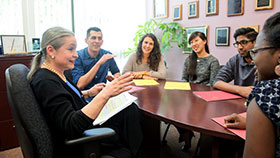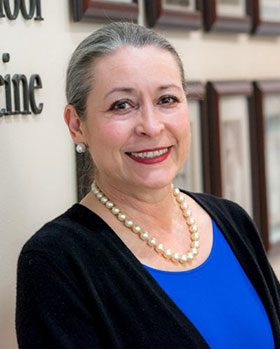From Picking Peaches to Picking the Class of 2026—And the Future Medical Workforce
 Raquel Arias, MD, has donated an estate gift to the Keck School of Medicine of USC, earmarked for scholarships. (Photo USC) |
Associate Dean of Admissions makes a personal investment in the Keck School’s student body.
By Janice O’Leary and Scot Macdonald
Raquel Arias, MD, isn’t a typical faculty member—she is invested in not just admitting the best students every year, but also easing their entrance into medicine as much as she can. As the Associate Dean of Admissions, she reviews the 9,000 or so applications that cross her desk and helps determine which 186 future doctors receive acceptance emails. She also makes calls to the select group of students receiving scholarships—this year, that was 47.
But she wishes it could be more, understanding personally how educational debt can affect the choices students make—from whether to attend medical school at all to the field they later specialize in and the next steps in their careers. Her vision is to see students at all levels of economic strata, from all backgrounds, realize their own goals.
To help make that mission a reality, in a move rare for an academic administrator, Arias has donated an estate gift to the Keck School of Medicine of USC, earmarked for scholarships. “I have no expensive hobbies—like a husband,” she jokes, “and I accidentally amassed a sum of money I could not imagine. I’m happy to give to the Keck School with the goal of recruiting the very best people. The Keck School is number one in my heart.”
Her strong commitment makes even more sense when she talks about her background—she’s a true example of someone who has achieved the American dream. She grew up in California’s Central Valley in an agricultural community and strove to become a physician and rise through the academic ranks at USC.
 Raquel Arias, MD, Associate Dean of Admissions, Keck School of Medicine of USC (Photo USC) |
“The worst job was picking peaches,” she says, thinking back to her childhood. “It was done on a ladder in 100-degree heat and paid by the basket, not by the hour. Peach fuzz would painfully get under my collar, and the day would be ruined—and it always happened. To this day, I eat only nectarines. It was miserable field work.”
After high school, the University of California, Santa Cruz, recruited her for her bachelor’s degree. She then earned a master’s in public health from University of California, Berkeley, before coming to the Keck School, as a member of the Class of 1982.
“USC was very pricey, even in the 1970s,” Arias says. “More money for one year’s tuition than my mom’s house was worth. It was beyond my imagination. I joined the National Health Service (NHS) because I could understand paying the tuition back with service, not money.”
An NHS position opened in Merced, Calif., and Arias, an obstetrician by training, took it and delivered more than 1,000 babies at that hospital. She later returned to USC and rose to her current role as the Associate Dean of Admissions at the Keck School where she helps select incoming students.
“The same school that had the good sense or foolishness to accept me in the first place,” she says. “I do everything I can to recruit people with whom I will be proud to share a diploma. Many are just as afraid of coming here because of the debt as I was. I can recruit people, but I need help for people who are too afraid, understandably so. Even if they get into a school that isn’t as good as the Keck School, they fear paying all that cash, so they go elsewhere.”
Very few deans of admission would take their job so personally as to offer their own estates as support. With no children of her own, she says, “My job is caring for other people’s kids.”
“Dr. Arias was there for me before I even decided to come to Keck,” says current medical school student Ivonne Verduzco. “When I was choosing between schools, she listened to my questions and answered them honestly. She made me feel supported and heard, and that meant the world to me as a first-generation student. She became my mentor once I stepped onto campus. I approached her about research, organizational initiatives, personal dilemmas, and letters of recommendations, and she did the absolute most she could every time. She has a special quality of making you feel inspired and heard while laughing throughout.”
Arias is simultaneously community-minded, guiding the entire Keck School as much as she guides individual students. She admits the best and the brightest and makes sure the student body is a diverse one. Twenty-five percent of the current first-year class is composed of students underrepresented in medicine.
“Dr. Arias has an unwavering dedication to support the Keck medical students,” says Vice Dean for Medical Education Donna Elliott, MD, EdD, and Arias’s roommate when they were medical students at USC. “Her generous gift is not surprising to those who know her and her conviction. She knows that with increased scholarship funds, even more could be done to diversify the workforce of the future.”
“We have an obligation to the community at large,” Arias says. “We are the largest medical school in California, so we contribute the largest number of doctors to the state. Many public medical schools focus on private patients; we are the opposite, a private university that treats all of the public. Our student body should reflect the diversity of our state.”
And scholarships can make a critical difference in making that happen by attracting the finest students.
“The scholarships do not bring them to the level of debt of a public school,” she says, “but because of who we are and what we have done for 140 years, it is enough to let them know how we view them and how much we want them.”
With her gift, the Keck School will be able to show even more students how much they’re wanted.
© Pentera, Inc. Planned giving content. All rights reserved.
Disclaimer